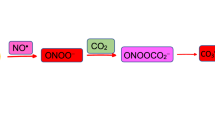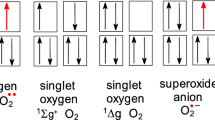Abstract
A disturbance in the antioxidant defense system including α-tocopherol, ascorbic acid and reduced glutahtione metabolism due to free radical induced oxidative injury has been implicated in various neuro-psychiatric disorders. The roles of these antioxidants, changes in their blood levels and correlation with oxidative stress were studied in a common psychiatric illness Schizophrenia. Fifty-eight subjects of either sex ranging in age from 18–60 years divided into two age groups (≤40 and >40 years) diagnosed for schizophrenia, and forty age and sex-matched normal subjects as controls were included in the study. Blood samples were analyzed for malondialdehyde (MDA), α-tocopherol, total ascorbic acid (TAA), dehydro ascorbic acid (DHAA), reduced ascorbic acid (RAA), leucocyte ascorbic acid (LAA) and reduced glutathione (GSH). A decrease in the levels of α-tocopherol, total ascorbic acid and reduced glutathione was found in schizophrenics compared to normal controls. Further a significant rise in oxidative stress and decreased antioxidant status was observed in the chronic stage of schizophrenia as compared to those in acute condition. A significant rise in dehydroascorbic acid with concomitant fall in reduced ascorbic acid suggests scavenging action of ascorbic acid and its utilization with increased oxidative stress as indicated by high blood malondialdehyde levels. Leucocyte ascorbic acid, a better index of ascorbic acid status was also found to be reduced in schizophrenics, suggesting depletion of body stores of ascorbic acid and the condition worsened with advancing age.
Similar content being viewed by others
References
Sies, H. (1991) Oxidative stress: From Basic Research to Clinical Application. Am. J. of Med. 91, 31S-38S. Review.
Lohr, J. B. (1991) Oxygen Radicals and Neuropsychiatric Illnesses. Arch. Gen. Psychiatry 48, 1097–1106.
Mahadik, S. P. and Scheffer, R. E. (1996) Oxidative Injury and Potential use of Antioxidants in Schizophrenia. Prostaglandins Leukot. Essent. Fatty Acids, 55, 45–54 Review.
Dusica, P. and Vesna, T. (2002) Oxidative stress as a marker of positive symptoms in Schizophrenia. Facta Universitatis. Medicine and Biology 9, 157–161.
Sudha, K., Rao, A. V. and Rao, A. (2001) Oxidative stress and antioxidants in epilepsy. Clin. Chem. Acta. 303, 19–24.
Marshall, W. J. and Bangert, S. K. (1995) Free radicals. In: Clinical Biochemistry; Metabolic and Clinical Aspects, 765–777, Churchill living stone, London, p 765–777.
Chen, L. H. (1989) Interaction of vitamin E and ascorbic acid (review). In Vivo 3, 199–209.
Bandopadhyay, D., Das, D. and Banerjee, R. K. (1999) Reactive oxygen species: Oxidative damage and pathogenesis. Current Science, 77, 658–666.
Morrison, A. P., French, P., Walford, L., Lewis, J. W., Kilcommons, A., Green, A. J., Parker, S. and Bentall, R. P. (1991). Cognitive therapy for the prevention of psychosis on people at ultra-high risk. Br. J. Psychiatry 185, 291–7.
Kaplan, H. I. and Sadock, B. J. (1989). Schizophrenia. In Comprehensive Textbook of Psychiatry-V. Vol. 1, Williams and Wilkins, USA, pp 699–815.
Natelson, S. (1971). Determination of ascorbic acid by 2, 4-dinitrophenyl hydrazine. In: Techniques of Clinical Chemistry, 3rd Edition, Charles C Thomas Springfield, USA, p 165–166.
Fabianek, J., De Filippi, Rickards, T. and Herp, A. (1968) Micromethod for tocopherol determination in blood serum. Clin. Chem. 14, 456–462.
Denson, K. W. and Bowers, E. F. (1961) The determination of ascorbic acid in white blood cells. Clin. Sci. 21, 157–162.
Beutler, E. (1971) Red cell metabolism. In: A Manual of Biochemical Methods, Grune and Stration, New York, p 103–105.
Stock, J. and Dormandy, T. L. (1971) The Autoxidation of Human Red Cell Lipids induced by hydrogen peroxide. Br. J. of Haematol. 20, 95–111.
Halliwell, B. (1994) Free radicals, antioxidants and human diseases: Curiosity, cause or consequence? Lancet, 344, 721–724.
Frei, B. (1994) Reactive oxygen species and antioxidant vitamins: mechanisms of action. Am. J. of Med. 97, 5S-13S; discussion 22S–28S. Review.
Benedicta, D. and Vivian, D. (2003) Oxidative injury and antioxidant vitamins E and C in Schizophrenia. Ind. J. of Clin. Biochem. 18, 87–90.
Ansari, K. U. (1996) Free Radical induced diseases. JIMA, 94 (1–12). 238–9.
Niki, E. (1987) Antioxidants in relation to lipid peroxidation. Chem. of Physiol. Lipids 44, 227–253.
Niki, E. (1987) Interaction of ascorbate and alphatocopherol. Ann. N. Y. acad. Sci. 498, 186–199.
Mann, G. V. and Newton, P. (1975) The membrane transport of ascorbic acid. Ann. N. Y. acad. Sci. 258, 243–252.
Loh, H. S. and Wilson, C. W. M. (1971) Relationship between leucocyte and plasma ascorbic acid concentrations BMJ. 3,733–735.
Kojo, S. (2004) Vitamin C: basic metabolism and its function as an index of oxidative stress. Curr. Med. Chem. 11(8), 1041–64.
Author information
Authors and Affiliations
Corresponding author
Rights and permissions
About this article
Cite this article
Dadheech, G., Mishra, S., Gautam, S. et al. Oxidative stress, α-tocopherol, ascorbic acid and reduced glutathione status in schizophrenics. Indian J Clin Biochem 21, 34–38 (2006). https://doi.org/10.1007/BF02912908
Issue Date:
DOI: https://doi.org/10.1007/BF02912908




